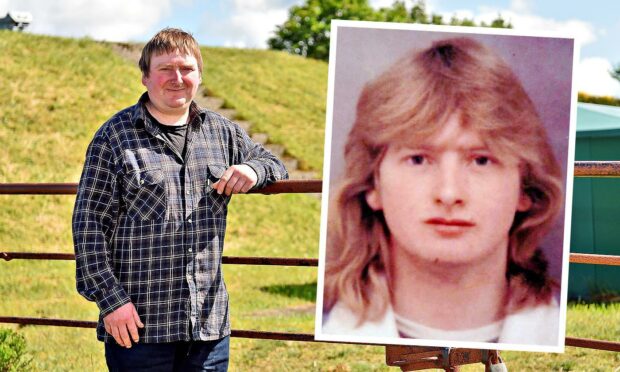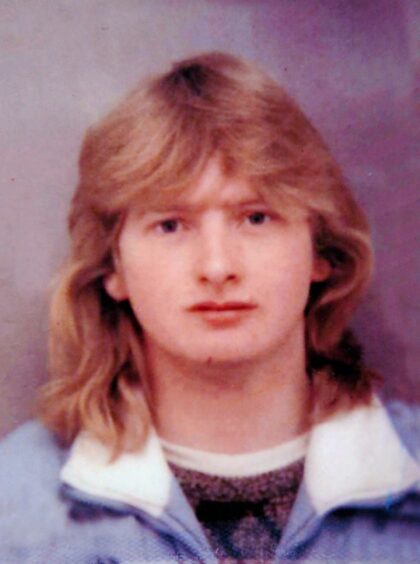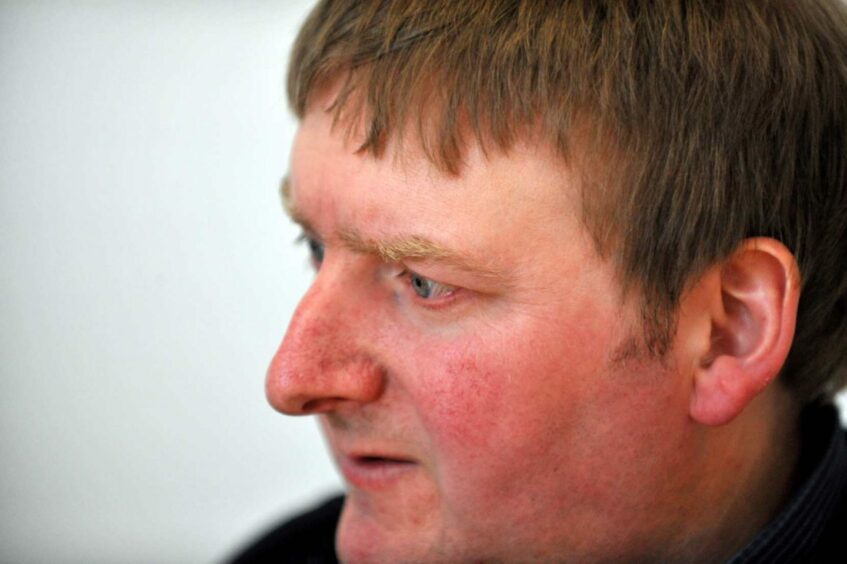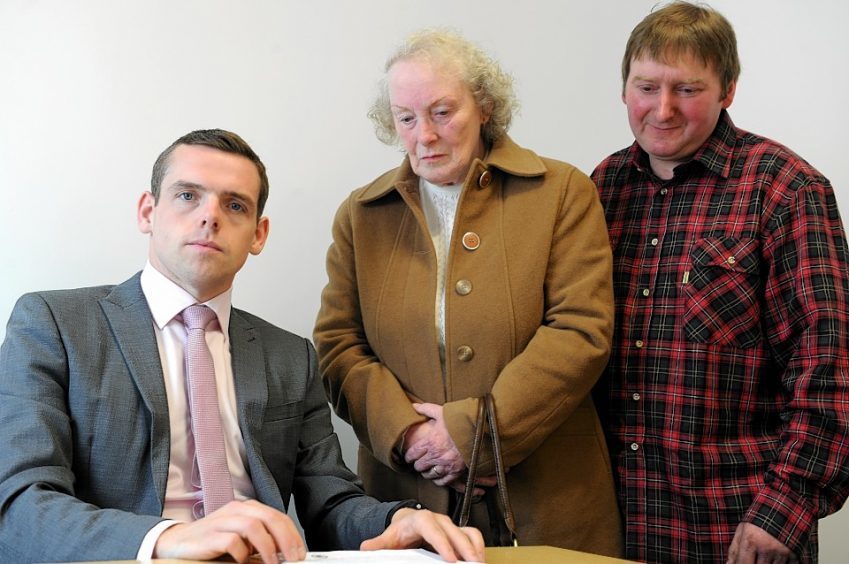A Moray man has lost a legal bid to exhume his teenage brother’s remains – crushing a family’s hopes for a new probe into his death.
Neil Riddel’s body was discovered in a field near Keith in 1991 and it was later ruled that the 19-year-old had died from a “probable suicide” by drug overdose.
But relatives continue to believe that the young apprentice blacksmith died while in police custody and was later dumped one mile away from his home in Aultmore.
Now, the family’s application to dig up Neil’s remains and have them re-examined by an independent forensic expert has been rejected by Elgin Sheriff Court.
It was blocked by the Crown Office and Procurator Fiscal Service (COPFS) which successfully fought against the Riddels in court.
Neil’s brother Ian, 53, has told The Press and Journal that the proceedings have cost him “nearly £30,000” but left the family no further forward in their campaign for answers.
‘The problem is, justice costs money’
“This money was put aside to get Neil exhumed, to get the forensic anthropologist, forensic pathologist, the team to carry out the work,” Mr Riddel explained.
“The Crown Office know that, if they can break me on the money side, they’ve won. They’ve used their power to stop us from getting permission but it won’t stop us.
“The family is determined. We will get Neil exhumed. The only way they can break the family is to take everything that we’ve got. The problem is, justice costs money.”
He added that Sheriff Robert McDonald, who made the decision after a total of four sheriffs heard the lengthy case, allowed him to speak “very little” during proceedings.
Ian said he hasn’t ruled out taking the case to the Supreme Court in London – although there is no guarantee judges there will accept the case.
Launching a new legal fight could also cost the Riddel family tens of thousands of pounds more.
What has been established about Neil Riddel’s death in court?
During a Fatal Accident Inquiry in 1992, a sheriff determined that Neil Riddel’s death was a “probable overdose”.
In 1998, Grampian Police reviewed its officers’ handling of the investigation but found no faults with the process and its findings.
Between 2008 and 2011, the area’s procurator fiscal for Grampian, Morag McLaughlin, re-examined the case but also concluded the evidence supported the original verdict.
Reacting to the latest development at Elgin Sheriff Court, a spokesperson for the COPFS said: “We understand that Ian Riddel and his family have endured a significant loss.
“Mr Neil Riddel’s death has been the subject of a number of thorough reviews, including a full review in 2011 and subsequent reviews arising from the concerns of his family.
“None of those reviews identified any evidence which contradicts the findings of the initial investigation or the FAI.”
‘No way Neil killed himself’
An empty bottle that had contained anti-depressants was found near Neil Riddel’s body more than three decades ago.
Toxicology tests later concluded that he had died from a probable overdose of an anti-depressant drug called Prothiaden.
But his brother Ian still alleges that Neil lost his life in a police cell in Keith after he complained about two officers who he had recently accused of assaulting him.
Mr Riddel has previously told The Press and Journal: “There is no way that Neil would have killed himself. When I saw his body he had bruises around his head”.
He said his brother had two death certificates, the original from 1991 stating his death was a “suicide” and a second issued in 1996 which was altered to state “possible suicide”.
It’s claimed the second death certificate indicated that the toxicological analysis was still “awaited” at the time the 19-year-old was buried.
‘Buried before tests concluded’
Mr Riddel also questioned how thorough the post-mortem was.
He said: “They did blood and urine tests but never dissected him,” and added: “Neil was buried before the tests were concluded”.
According to the COPFS, a post-mortem examination is required when a death is being treated as suspicious but is not necessarily needed if there is no evidence of foul play.
The family has also claimed that they were not allowed to view Neil’s body in his coffin, a situation that relatives perceived as suspicious.
They also remain concerned that Keith police officers, who the teenager had complained about, were involved in the original investigation into his death.
But their claims that that shouldn’t have happened have also been rejected by the authorities.
Calls for public inquiry dismissed
In 2017, the Scottish Government dismissed calls to launch a public inquiry into Neil Riddel’s death.
Mum Margaret Riddel then died of cancer in December 2019, a year after his dad, also named Ian, passed away.
“Mum died two years ago on Boxing Day and the last thing she said to me was, ‘Get the truth’,” Mr Riddel said.
But a costly attempt at “bypassing the police and parliament” has ended in disappointment for all of them.
Moray MP and Highlands and Islands MSP Douglas Ross has supported the family over the years.
He said: “This has been a long campaign they’ve been leading to try and get answers and I know how bitterly disappointed Ian Riddel will be.
“The fact that he applied to have his brother’s body exhumed shows the lengths he feels he has to go to to get answers that he believes are still unresolved.
“I’m sure he will look for alternative ways to answer the concerns he still has over his brother’s death.
“It’s right that I leave these decisions to the authorities who are asked to determine them but I’ll help and support the family in any way that I can.”
Assistant Chief Constable Emma Bond said: “We recognise the impact the loss of a family member can have and our thoughts remain with the Riddel family.
“Neil’s death was investigated at the time, fully reported to the Crown Office and Procurator Fiscal Service and information relating to the circumstances being made available to officials.
“His death has been the subject of a Fatal Accident Inquiry and further review by police.
“If any new information comes to light, it will be assessed.”
The timeline
- 1991: Neil Riddel’s body is found in a field near his family home at Aultmore. The cause of death is recorded as suicide through a drug overdose.
- 1992: A Fatal Accident Inquiry (FAI) is held, but the apprentice blacksmith’s family claims that statements from two friends who Mr Riddel was thought to be out with that night are not presented as part of the probe. His death is ruled the result of a “probable overdose”.
- 1996: The Riddel family requests a second death certificate previously withheld from them. It indicates that the toxicological analysis was still “awaited” at the time the 19-year-old was buried.
- 1998: Grampian Police reviews the case and finds no faults with officers’ handling of it.
- 2008: Solicitor General Frank Mulholland QC instructs the area procurator fiscal for Grampian, Morag McLaughlin, to re-examine the evidence in relation to the death.
- 2011: Mrs McLaughlin completes her review, and passes it to the Crown Counsel for consideration. The Crown Counsel also backs the original verdict.
- 2015: The Riddel family presents police with a dossier arguing their case but top officers reject their appeal for a new investigation.
- 2016: Moray MP Douglas Ross vows to do his utmost to get answers to some of the “unanswered questions” which have plagued the family.
- 2017: The Scottish Government rejects the family’s appeal to launch a public inquiry.
- 2019: Margaret Riddel dies aged 81. The Riddel family’s request to the Lord Advocate that the Crown Office reopen the police investigation is turned down.
- 2022: Ian Riddel loses a legal bid after lodging papers directly with Elgin Sheriff Court, asking for permission to exhume Neil’s remains to have them re-examined by an independent forensic expert.
For all the latest court cases in Aberdeen as well as crime and breaking incidents, join our Facebook group.




